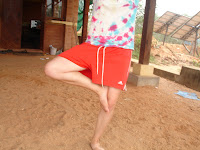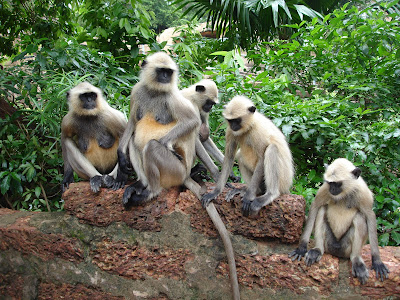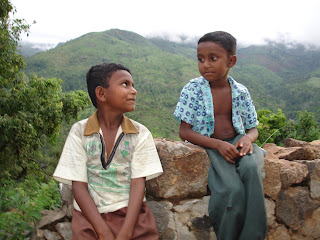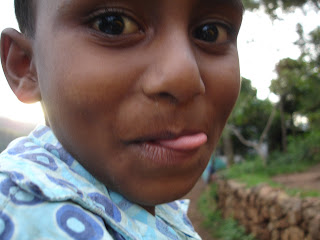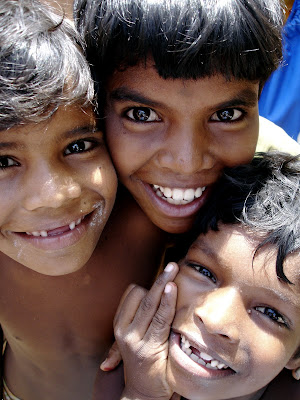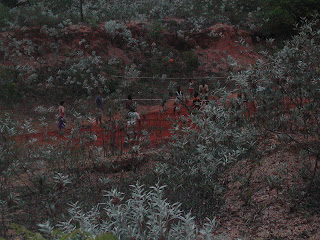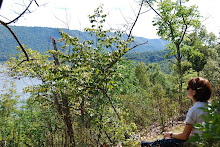This post will mostly be me gushing about our last several days. I am having an AWESOME time!
I'm writing from a small room on the side of a post office in a cute mountain town called Kumily. Most of our student group travelled here for a 4-day vacation. This town is know for its nature reserve called Periyar Wildlife Sanctuary, a beautifully preserved area full of wild elephants, bisson, boars, sambar (an Indian species of deer), monkeys, otters, turtles, birds, frogs, spiders, leeches, and a vast wealth of flora-- including plants/trees of cinnamon, cardamom, pepper, ginger, tumeric, vanilla...pretty much everything! The other day, five of us took a guided 3-hour nature walk through the area, where we saw all of the above things except for elephants.
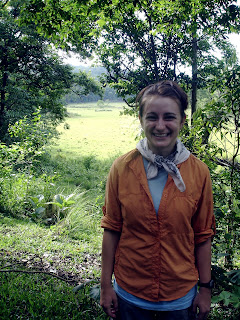
But later in the day, we took a boat ride on the Periyar lake, and among the above things again, we saw a family of wild elephants! It was from a distance; our boat couldn't go too close to shore because the water was too shallow. I almost preferred to see them from the distance; these elephants, unlike others I've seen, are actually wild and free, and I'm glad that we weren't quite able to breach that boundary. It was soo cool to see them and their trunks swinging away. I was able to get some pictures, but I'm not sure how they came out yet. During our jungle walk, we each attracted a few leeches, but luckily we had rented some $0.50 leech socks, which are a thick canvas that you wear in your shoes/sandals to keep the leeches away from your feet.
Yesterday, we went to see a local tea plantation and factory, which was SO cool. As far as the eye could see, there were hills covered in tea plants. In the factory, we watched as the fresh tea leaves were thrown down a shredding shoot.
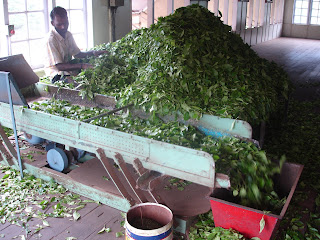
Below, they landed on a conveyor belt, which took them through a series of five presses. Then they went through a tumbler to be dried. After that, they transferred to another grinder, and then into a firer. There the leave bits are roasted, and they come out small, very hot, grainy pieces. A sieve conveyor belt separated the grain sizes, and the finest of the fine grained tea was so very fine. The tea is cleaned and then sent nearby to be packaged. It was amazing to see the whole operation. Outside, we walked around the plantation and took in the beautiful sights. We passed many houses of the factory workers and met several children who asked us for pens and candy.
Next we went to a two-acre spice garden, called Abraham's Spice Garden, which was amazing.
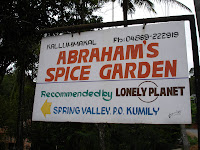
Abraham runs a garden that his father began in 1952; now the garden, which is completely organic, is producing every Indian fruit/vegetable/herb you can imagine. Abraham led us on a tour through the garden, along the way letting us taste, smell and photograph. One of my favorites to taste was the rose apple, which is a small tree fruit. We had it when it wasn't quite ripe, so it was a bit tart, but I think that's the reason that I loved it! He also let us try two different varieties of bananas that he grows there. We also simply touched our tongues to the inside of some chilly pepper, and still felt the burning effects. It was a wonderful visit, and we all agreed that we'd love to have the life that Abraham does.

His father, now quite an older man, tagged along on the tour, occasionally picking leaves and herbs, crushing them, and passing them to me to smell or taste. He didn't speak English, but he treated us so nicely. I loved meeting him as well, to grasp the family lineage of the beautiful garden.
Later, we treated ourselves to one-hour, full-body ayurvedic massages...ooo la la. It's very different than an American massage; less work and pressure on specific areas, but more repetitive rubbing/chopping and lotttts of oils. My masseuse was a very small Indian woman, whose hands were so tiny. Yet she was able to reeeeeally work my muscles! It was a bit awkard at first, what with the nakedness, but once the massage started I was able to relax and enjoy. :)
We met a group of 5 Indian men at our homestay, who were taking a holiday for one of their birthdays. They were very, very nice. They are from Hydrabad in the state of Andra Pradesh, which according to them has the best food in India (and the made sure to tell us that when Bill Clinton visited, he came to Hydrabad and loved their traditional dish, chicken biriyani!). They were unhappy with the local food, so they bought rabbit, fish and chicken from the market and prepared lunch and dinner themselves. They invited us to join, so we spent the evening hanging out with them, which was actually quite fun. They were very respectful of us, but we also had many laughs and jokes together. They taught us a card game that they call Sequence, which I think is pretty much what we call Rummy. So we played that for a while, which was really enjoyable. Then we had the fish and chicken, with rice and paratha bread they bought, and it was deeeeeeeeelicious-- seriously, the best food that I've had while I've been here. It was really spicy, but really good. At midnight, the men brought out a cake for their friend's birthday and we sang happy birthday. The "candle" in the cake was a burning cigarette. They cut the cake and we ate most, but some of it was smeared on the birthday boy's face by his friends. They were a really fun bunch, and they spoke very good English so it was easy to communicate. I'm really glad we had that genuine experience.
This morning, we woke up early to go see, bathe and ride captive elephants. I really was hesitant to go; I feel horrible when I see the elephants with chains around their legs; how can we render such a large, powerful animal so helpless?
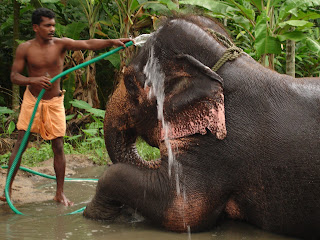
But I went along with our group, and I'm guess glad that I did. Although I reeeally don't appreciate what the trainers do to the elephants to domesticate them, it was so special to be able to touch and be near this elephant. Her name was Maria. We also saw a mother and baby elephant, and the baby was so adorable. He came towards us and wrapped his trunk around our hands as he smelled us.
Today we also spice-shopped. This area is a major spice trading center, so pretty much every other store on the street is a spice shop. The man who runs our hotel, Suresh, is very very sweet and helpful in acquainting us with the town, but he also knows how to work us westerners. He took us to a spice supermarket, where afterwards I found out I got majorly ripped off. Suresh had insisted that we go there because the prices are "better," but when I stopped into several shops afterwards, I found the spices were being sold at nearly 50% the price that I had paid. I have one word: commission. I know that this is part of the game, but I was pretty annoyed, and I am going to talk to Suresh about it this evening.
Right now, we are about to go see a kathakali show, which is a traditional south Indian drama. It actually starts in half an hour, so I gotta run!
Tomorrow morning, we set out from Kumily towards another hill town called Kodaikkanal. It's also a wonderful small town. Hopefully I can load some pictures there and post them for you to see.
Thanks for reading!!!








